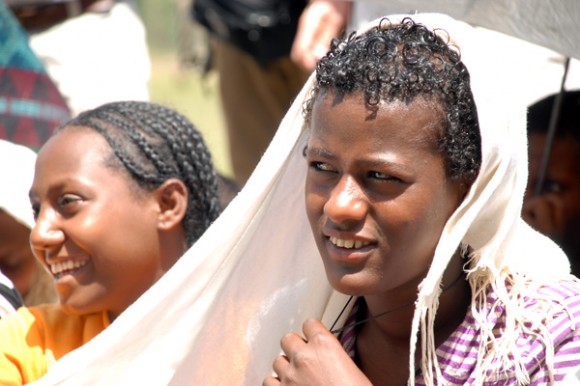We know that when we empower girls, everybody benefits. Girls who are educated, healthy and free can transform their communities and pass on the benefits to their children, and to their children’s children.
Yet the reality is that women are still treated as second-class citizens of this world; girls are almost completely ignored. Girls have no status, no protection and no prospects in many families and communities – and this is simply the way things are. Inequality is so entrenched that it isn’t even questioned.
That is why today, the inaugural International Day of the Girl, marks an important step. Even more important, I believe, is the fact that child marriage has been chosen as the official theme for the day. At last, we are recognising that girl child who has been invisible for so long.
Investing in girls means ending child marriage
The importance of investing in girls is increasingly understood among policy-makers. The UK is already doing good work, focusing specifically on girls’ education and economic independence, preventing violence against girls and women, delaying early pregnancy and supporting safe childbirth.
Yet there is still much progress to be made. There is one thing that the goals of universal education, ending violence against women, maternal and child health, economic development and combating HIV/AIDS all have in common: each one of them is directly hindered by child marriage. Girls who marry before they turn 18 are more likely to drop out of school, live in poverty, suffer domestic violence, become pregnant before they are ready, and die in childbirth. Marrying too young is a sure way to perpetuate poverty and inequality in a girl’s community.
Child marriage is more than a harmful practice that should be tackled in its own right; it is an entry point to all these other issues. If we want girls to stay in school, to be safe and healthy, to earn their own income and invest back into their families and communities, we must end child marriage.
We know what works
Ending child marriage means changing long-held traditions and challenging taboos. It is not something that can be imposed from outside in the name of progress or development, and experience has shown that simply passing laws banning the practice has little effect in communities where it remains the norm.

There is, however, extraordinary work being done in some communities. Last year my fellow Elders visited the Berhane Hewan project in the Amhara region of Ethiopia, where the most common age of marriage for girls is 12. This remarkable project is proving that when families and community leaders have the chance to have open, informed conversations about gender equality, sexual health and their legal rights, they actually embrace change! Similar work is being done in Senegal and India.
These projects are extremely promising, but their impact is still very localised. It is time for us to share this model for change more widely, scaling up the programmes that we know to be successful. We must also do more to bring together all those working to end child marriage in Ethiopia, India, Niger, Nicaragua and elsewhere – this is very much a priority for the global Girls Not Brides partnership that The Elders have supported, which has grown from nothing to almost 200 member organisations all over the world in less than two years.
We know that the importance of child marriage is finally gaining recognition at the highest levels. We now need that recognition to filter down to programmes on the ground.

3 comments
Comment by Dan Watson posted on
Thank you Graça, this is a very important topic so it's nice to hear such progress is being made.
I agree with your reasoning that it is generally more important, and more effective, to empower girls to be the enacters of change than to lecture on the subject of status and equality.
Having said that it is heartening to read that discussion can open up cultural norms for public debate in this way! I believe that cultural norms will, in their discursive relationship with practices, reward the empowerment of young women with a higher status. But, if, in the Amhara region, cultural norms can lead the way, then why not.
As long as cultural norms are never criticised; this can so easily lead to resentment (see my article on the difficulty of outsiders appearing to desire cultural change http://archive.intdevblog.futureforeignpolicy.com/2012/06/tackling-inequality-across-society-case.html) . As long as cultural norms are examined but not chastised, there is a bright future for girls worldwide.
Thank you once again for bringing a little light to the cynical.
Comment by Girls Not Brides posted on
Dan, you're right to say that cultural norms and traditions should be examined, not chastised. As Graca Machel has said previously: "We should be respectful but we must also have the courage to stop harmful practices that impoverish girls, women and their communities."
It is also key to make sure that community groups have a central role in developing programmes to prevent child marriage – successful programmes will be those that take into account the context in which a community lives.
Comment by chinta.williammoses posted on
eradicate illiteracy worldwide and provide free education, I am ready to joining with your organisation Appeal to support to our organisation